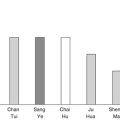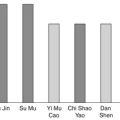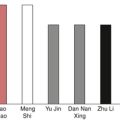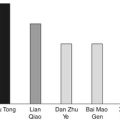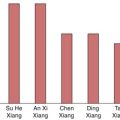Chapter Twelve. Herbs that stop bleeding
 |
1. What are the characteristics of herbs that stop bleeding?
Herbs that stop bleeding are used for acute bleeding conditions and they treat the manifestations rather than the cause of the syndrome. Therefore, when the bleeding is stopped, the patient should be treated according to the differentiation of the syndromes.
Herbs that stop bleeding have the following characteristics.
Sour or astringent
Sour and astringent substances possess an astringent property—that is, they reverse abnormal leakage of blood and their tendency of action is inwards. They treat the symptom of bleeding rather than its cause and are often used in different bleeding conditions as a first aid procedure. The commonly used substances are Bai Ji ( Bletillae tuber)**, Ou Jie ( Nelumbinis nodus rhizomatis), Zong Lü ( Stipulae trachycarpi fibra), Hua Rui Shi ( Ophicalcitum) and Zao Xin Tu ( Terra flava usta).
Cold and bitter
Coldness can clear Heat and bitterness can reduce Fire. Since bleeding is often caused by Heat, especially in acute cases, there exist herbs that not only can stop bleeding, but also can clear Heat. They are used as herbs that treat both the cause and the symptoms of the disorder. They are Da Jì ( Cirsii japonici herba seu radix), Xiao Ji ( Cirsii herba), Ce Bai Ye ( Platycladi cacumen), Huai Hua ( Sophorae flos), Di Yu ( Sanguisorbae radix) and Bai Mao Gen ( Imperatae rhizoma).
Promoting the Blood circulation and stopping bleeding
It does not sound logical that the functions of moving the Blood and stopping bleeding should coexist in one herb. Nevertheless, these herbs do exist and they are particularly used when bleeding is caused by obstruction due to congealed Blood, such as in menorrhagia caused by trauma, hysteromyoma or heavy bleeding due to retained placenta. The herbs that can remove congealed Blood and stop bleeding are San Qi ( Notoginseng radix), Qian Cao Gen ( Rubiae radix), Pu Huang ( Typhae pollen), Xue Yu Tan ( Crinis carbonisatus) and Hua Rui Shi.
Usage of charred herbs
In TCM, it is considered that bleeding will be stopped by the use of black, charred herbs. In clinical practice, as good results with this method have substantiated the concept, many herbs are charred particularly for the purpose of stopping bleeding. The commonly used herbs are Da Jì, Xiao Ji, Pu Huang, Ou Jie, Zong Lu and Xue Yu Tan.
2. What precautions should be observed when using herbs that stop bleeding?
Herbs that stop bleeding are particularly used in acute conditions so as to control the bleeding in time. However, after the bleeding has stopped, or even when there is still some bleeding present, herbs that treat the cause should also be used. For example, if the bleeding is caused by Heat, such as in colitis, dysentery and enteritis, herbs that clear Heat and cool the Blood should be used. If the bleeding is caused by Qi deficiency, herbs that tonify the Qi should be prescribed to hold the Blood, such as in thrombocytopenia. If the bleeding is caused by Yin deficiency with Yang rising, such as in cerebrovascular accident, herbs that direct the Yang downwards must be added.
Herbs that stop bleeding are effective for treating many kinds of bleeding conditions. However, when the bleeding is very heavy and presents a danger to the patient, the person should be sent to hospital immediately. If it is impossible to reach a hospital, a large dose of Ren Shen ( Ginseng radix) should be applied, together with the herbs that stop bleeding, to hold the Qi in order to control the Blood and stop bleeding.
Since most of these herbs have a sour, astringent or cold nature that may cause stagnation of Blood, these herbs should be used for a short period of time only or combined with herbs that can gently disperse the stagnation.
3. What are the differences between Da Jì ( Cirsii japonici herba seu radix) and Xiao Ji ( Cirsii herba)?
Da Jì and Xiao Ji are sweet and cold, and both enter the Liver and Heart meridians. The fresh or raw herbs are able to cool the Blood and stop bleeding. If they are charred, they acquire an astringent property, and then they can also stabilize the Blood and stop bleeding. In clinical practice, they are often used in combination to enhance the effect of stopping the bleeding. These two herbs are also effective for treating jaundice and other disorders of bile secretion, and hypertension.
Da Jì is colder than Xiao Ji and has a stronger action in reducing Heat, cooling the Blood and stopping bleeding. It is used for bleeding caused by Heat, such as seen in pulmonary tuberculosis, gastric ulcer, menorrhagia or diseases of the liver.
Xiao Ji is not so cold, and its function of cooling the Blood and stopping bleeding is gentler than that of Da Jì. It is especially effective for reducing Heat in the Lower Jiao and in treating bleeding caused by Damp-Heat in the Lower Jiao, such as seen in acute urinary tract infection, cystitis and pyelonephritis.
4. Xiao Ji ( Cirsii herba) and Bai Mao Gen ( Imperatae rhizoma) can both treat blood in the urine. What are the differences between them when they are used in clinical practice?
Xiao Ji and Bai Mao Gen are sweet and cold. Both can cool the Blood and stop bleeding. They can also promote urination and eliminate Damp-Heat from the Lower Jiao. They are especially effective for treating bloody urine caused by Damp-Heat in the Lower Jiao, which injures the local blood vessels and disturbs the local Blood circulation. However, there are some differences between these two herbs in clinical practice.
Xiao Ji enters the Heart and Liver meridians. Besides cooling the Blood and stopping the bleeding, it can also promote urination and reduce edema, so it is often used for treating nephritis. It can also be used to treat hypertension, hepatitis and hyperlipemia.
Bai Mao Gen enters the Lung and Stomach meridians. Compared with Xiao Ji, its effect in cooling the Blood and stopping the bleeding in the Lower Jiao is weaker. However, it stops bleeding not only in the Lower Jiao, but also in the Upper Jiao, so can be used in conditions such as nose bleeding and hemoptysis. It also generates the Body Fluids and relieves thirst. It is more suitable for use in patients suffering from thirst, a dry mouth and nose, who at the same time have symptoms in the Lower Jiao, such as acute urinary tract infection, nephritis and other febrile diseases.
5. Huai Hua ( Sophorae flos), Huai Jiao ( Sophorae fructus) and Di Yu ( Sanguisorbae radix) are often used for treating intestinal hemorrhage. What are the differences between these three herbs?
These three herbs are all bitter and cold, and their tendency of movement in the body is downward. They enter the Liver and Large Intestine meridians, are effective for clearing Heat in the Lower Jiao, cooling the Blood and stopping bleeding, and are used for the treatment of colitis, dysentery and hemorrhoids. In clinical practice, they are often combined to increase the therapeutic effects. However, there are differences between them.
Huai Hua is slightly cold, and its ability to clear Heat and cool the Blood is not as strong as that of the other two herbs, but it has a stronger function in stopping bleeding than Huai Jiao. It is an important herb for treating dysentery and hemorrhoids. Since it enters the Liver meridian, and as a flower it has a tendency to ascend and disperse constrained Heat, it can cool the Liver, clear Heat in the head and benefit the eyes. It is used for the treatment of hypertension and dry, burning sensations in the eyes.
Huai Jiao is colder than Huai Hua, and its functions of clearing Heat and reducing Fire are also stronger. Since it moves downwards, it is very effective for treating hemorrhoids and it is often put in creams for topical use. Like Huai Hua, it also has the function of clearing Heat in the Liver and is used to treat hypertension, headache and dizziness.
Di Yu is bitter, sour and cold. It not only cools the Blood and stops bleeding, but also contracts and holds the Blood. It treats bleeding in the Lower Jiao and is used for colitis and menorrhagia. As it is also able to reduce swelling and stop pain, it is suitable for treating external hemorrhoids.
6. What are the differences between raw Pu Huang ( Typhae pollen) and charred Pu Huang?
Pu Huang is a gentle herb; it is sweet and neutral, and enters the Pericardium and Liver meridians. As the raw form can promote the Blood circulation and dissolve congealed Blood, it is used to treat irregular menstruation, dysmenorrhea and abdominal pain after giving birth. Furthermore, it is also effective for stopping bleeding and so it is used for bleeding conditions. It is a good choice for bleeding caused by Blood stagnation.
If Pu Huang is charred, it acquires warm and astringent properties, and is stronger than raw Pu Huang for stopping bleeding in any part of the body. However, unlike the raw herb, it does not promote Blood circulation.
7. What are the characteristics of San Qi ( Notoginseng radix)?
San Qi is a very effective herb for stopping bleeding. It is sweet, slightly bitter and warm, and enters the Liver and Stomach meridians. Sweetness can slow down the development of a critical situation, warmth can unblock the meridians and bitterness can purge congealed Blood. San Qi is effective in breaking up congealed Blood and harmonizing it. As soon as the congealed Blood has disappeared, the Blood turns back to its normal pathway, and the bleeding will stop. If the Blood circulates properly, the swelling is reduced and the pain stops.
Since San Qi can treat bleeding due to Blood stagnation, it can stop bleeding without the side-effect of causing new Blood stagnation, so it is widely used in the treatment of trauma, wounds, skin ulcers, carbuncles, epistaxis, hematemesis, uterine bleeding, blood in the urine and intestinal hemorrhage. It can be applied both internally and topically.
8. Ai Ye ( Artemisiae argyi folium), Pao Jiang (quick-fried Zingiberis rhizoma preparatum) and Zao Xin Tu ( Terra flava usta) are substances for warming the Interior and stopping bleeding. What are the differences between them?
Ai Ye is warm and aromatic, and enters the Liver, Spleen and Kidney meridians. It is able to warm the Interior, expel Cold, stop bleeding and alleviate pain. Its function focuses on the Blood level of the Lower Jiao. It is effective for treating menorrhagia, and uterine bleeding during pregnancy or due to hysteromyoma when there is Cold in the Lower Jiao and the Blood. This herb can also be used topically. Also, Ai Ye is the substance from which moxa sticks are made and, used in moxibustion, it can penetrate the skin and meridians, warm the Qi and Blood and expel internal Cold.
Pao Jiang is bitter and warm, enters the Spleen and Liver meridians and also enters the Blood level. Although, like Ai Ye, it can warm the Interior, stop bleeding and alleviate pain, its function focuses on the Middle Jiao. It is especially effective for treating bleeding due to Spleen-Yang and Qi deficiency, which then fail to control the Blood. Such bleeding may be located in the Stomach, intestines or Uterus.
Zao Xi Tu is warm and astringent, and enters the Spleen and Stomach meridians. It warms the Interior and stops bleeding in both the Middle Jiao and Lower Jiao, such as is seen in bleeding from the Stomach, intestines or Uterus. Moreover, it binds up the intestines and stops diarrhea. It is more suitable for conditions of Spleen-Yang deficiency, such as seen in chronic colitis, which manifests as abdominal pain and cramping, diarrhea, intestinal hemorrhage, cold hands and feet, and a pale complexion.
Comparisons of strength and temperature in herbs that stop bleeding
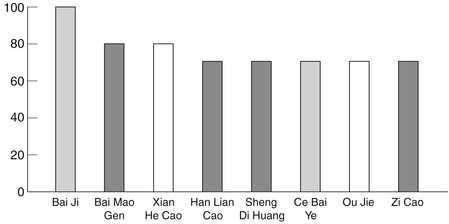 |
| Fig. 12.1. |
| Comparison of the herbs that stop bleeding from the Lung. Bai Ji ( Bletillae tuber)**, Bai Mao Gen ( Imperatae rhizoma), Xian He Cao ( Agrimoniae herba), Han Lian Cao ( Ecliptae herba), Sheng Di Huang ( Rehmanniae radix), Ce Bai Ye ( Platycladi cacumen), Ou Jie ( Nelumbinis nodus rhizomatis), Zi Cao ( Arnebiae/Lithospermi radix). |
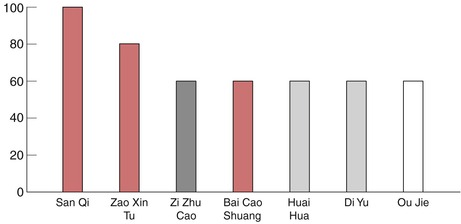 |
| Fig. 12.2. |
| Comparison of the herbs that stop bleeding from the Stomach and intestines. San Qi ( Notoginseng radix), Zao Xin Tu ( Terra flava usta), Zi Zhu Cao ( Callicarpae folium), Bai Cao Shuang ( Fuligo plantae), Huai Hua ( Sophorae flos), Di Yu ( Sanguisorbae radix), Ou Jie ( Nelumbinis nodus rhizomatis). |
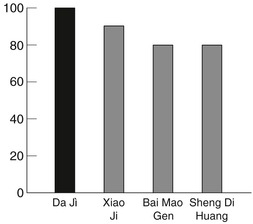 |
| Fig. 12.3. |
| Comparison of the herbs that stop bleeding from the urinary tract. Da Jì ( Cirsii japonici herba seu radix), Xiao Ji ( Cirsii herba), Bai Mao Gen ( Imperatae rhizoma), Sheng Di Huang ( Rehmanniae radix). |
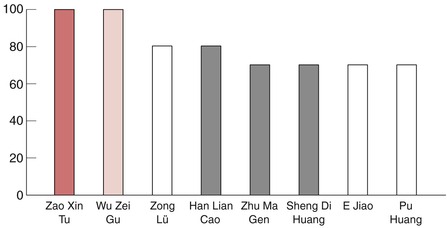 |
| Fig. 12.4. |
| Comparison of the herbs that stop bleeding from the Uterus. Zao Xin Tu ( Terra flava usta), Wu Zei Gu ( Sepiae seu sepiellae os), Zong Lü ( Stipulae trachycarpi fibra), Han Lian Cao ( Ecliptae herba), Zhu Ma Gen ( Boehmeriae radix), Sheng Di Huang ( Rehmanniae radix), E Jiao ( Asini corii colla), Pu Huang ( Typhae pollen). |
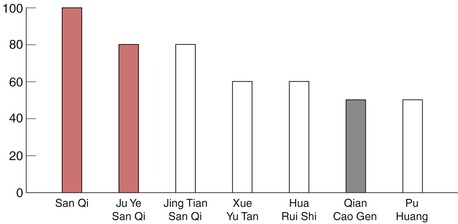 |
| Fig. 12.5. |
| Comparison of the substances that stop bleeding from trauma. San Qi ( Notoginseng radix), Ju Ye San Qi ( Gynura segetum), Jing Tian San Qi ( Sedi aizoon herba), Xue Yu Tan ( Crinis carbonisatus) Hua Rui Shi ( Ophicalcitum), Qian Cao Gen ( Rubiae radix), Pu Huang ( Typhae pollen). |
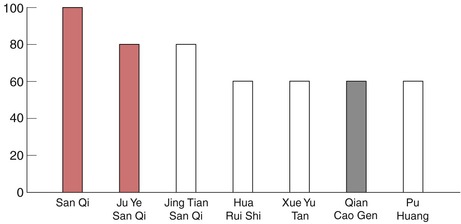 |
| Fig. 12.6. |
| Comparison of the herbs that stop bleeding and dissolve congealed Blood. San Qi ( Notoginseng radix), Ju Ye San Qi ( Gynura segetum), Jing Tian San Qi ( Sedi aizoon herba), Hua Rui Shi ( Ophicalcitum), Xue Yu Tan ( Crinis carbonisatus), Qian Cao Gen ( Rubiae radix), Pu Huang ( Typhae pollen). |
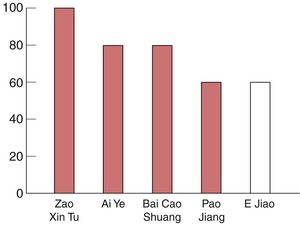 |
| Fig. 12.7. |
| Comparison of the herbs that stop bleeding and are warm in temperature. Zao Xin Tu ( Terra flava usta), Ai Ye ( Artemisiae argyi folium), Bai Cao Shuang ( Fuligo plantae), Pao Jiang (quick-fried Zingiberis rhizoma preparatum), E Jiao ( Asini corii colla). |
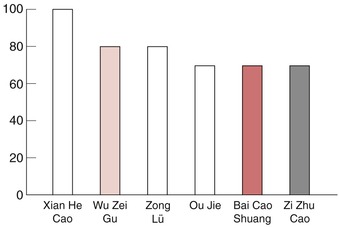 |
| Fig. 12.8. |
| Comparison of the astringent herbs that stop bleeding. Xian He Cao ( Agrimoniae herba), Wu Zei Gu ( Sepiae seu sepiellae os), Zong Lü ( Stipulae trachycarpi fibra), Ou Jie ( Nelumbinis nodus rhizomatis), Bai Cao Shuang ( Fuligo plantae), Zi Zhu Cao ( Callicarpae folium). |

